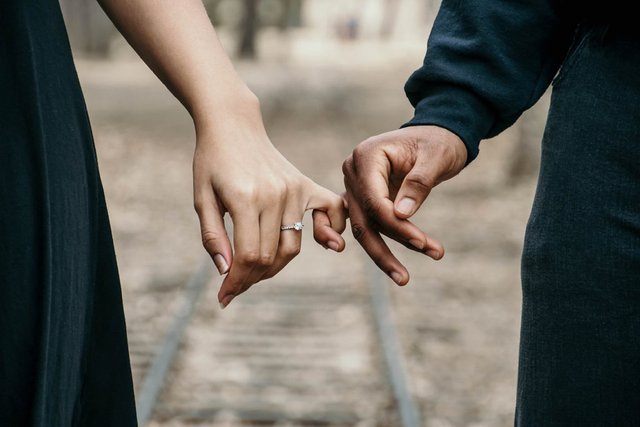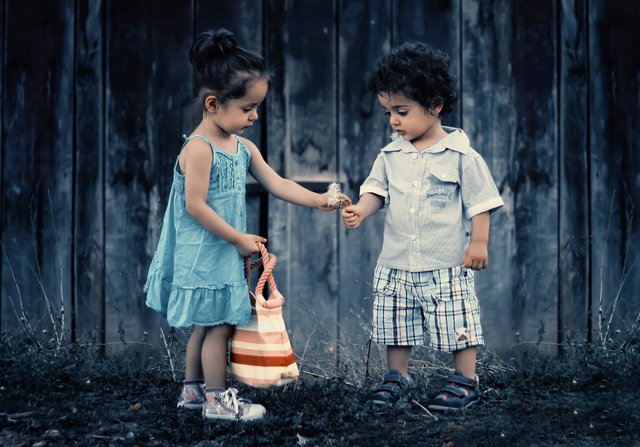A lesson on love

A couple of days ago I was sitting in a bar with a friend of mine. On this evening I learned a lesson that I will never forget. My friend told me a story about fish love. My friend said:" If you ask people why they eat fish, they often say that they love fish." And I was like:" Yes of course." But they don't my friend said, they love themselves. Let me explain what he meant.
Lots of love in the world is fish love. Fish love means that you love something because you love yourself. It has nothing to do with the other person. If you find someone beautiful and that's one of the reasons you 'love' them. You don't love them, you love yourself. You love the fact that you have pleasure by looking at them. That's not real love, at least according to Dr Abraham Twerski. Love starts by giving and real love comes from giving something without expecting anything in return. Because if we give something from ourselves, we invest a little of ourselves in someone else. When we do this we start loving, because we love ourselves. And when we invest a little bit of our self-love in someone else, a little part of us is them. This will make us love them because we love that little part of ourselves in them.
I think Dr Abraham Twerski makes a good point. I just wondered in what way should we give then? It was at this moment that I came across something called love language. An interesting concept about how we communicate our love towards each other. Although I am a bit sceptical about the exact science of the concept, the idea is really cool and I see some truth in it.

The basic principle is that we all communicated our love a bit different. This can be based on our experiences and the way that we're raised. Dr Gary Chapman (the man who introduced this concept) argues that everybody has a primary and a secondary way of communicating love. According to Chapman, there are five different love languages in which we can communicate. Each of these can be either our primary or secondary way of communicating our love. Each of the five is a way of giving something, and that's what makes it so interesting to me.
The five love languages
Quality Time
Chapman explains in his book (The five languages of love) that quality time is giving someone your undivided attention. This doesn't mean sitting on the couch watching television. This means sitting on the couch with the television off, looking at each other and talking. Quality time can be a love language expressed by anyone, and finding ways to express it within you non-romantic relationships can be important to, says Chapman.
Physical Touch

Physical seems such a must in the list of love language, but it doesn't only come down to sex (you pervert, I knew you're thinking about it haha.) It also comes down to the moment that your husband/wife or boy/girl-friend comes home and tells you about his/her stressful day. You can be there for her and listen (quality time), but you can also offer to give a message. It's these small expressions of love through physical touch that can make a difference.
Words of Affirmation
When I first read this I was like "doesn't the guy just mean compliments?" and yes, that's exactly what it means. Other peoples admiring comments from friends, colleagues or your boss can help you through your day. Yet at the end of the day, it is your spouse's admiring comment that will make your day. Everybody's compliments pitch in, but your spouses are always the most important one. He/She can motivate you like no one else can.
It's not just that positive words show love. Using affirmative words like 'love', 'peace,' and 'loving-kindness,' improve our brain functions. This results in increased cognitive reasoning and strengthened frontal lobes. Speaking and hearing positive words more often than negative once can activate the motivational centers of the brain, encouraging us to take positive action more often.
Gift Giving

Some people express and communicate love by giving a gift. The experience of carefully choosing of a tangible item to represent the relationship, and finally to the actual giving itself. Giving a gift helps to reinforce relationships by positively acknowledging each other. Both the giver and receiver benefit from the act of giving or receiving emotionally.
Acts of Service
Doing things to help your spouse is another way we can give. Chapman describes acts of service as, "doing something for your spouse that you know they would like for you to do." Do you know that feeling? The feeling of doing a selfless act. It gives yourself the feeling of love, by giving to others. I think this is one way I often give love.
Practical approach
Let's now look at how we can apply this in our lives. Each of us has its own primary and secondary way of love according to Chapman. This determines the way that we're used to giving love and receiving love. Let's say we had a relationship and I would give you love by giving you a gift, but giving gifts isn't in your primary or secondary way of love. Then you will still appreciate it, receive love, but not to the full extent. You wouldn't fully experience love in the way that I meant it since it's not your way. We're just miscommunicating!
What we can learn from this is that we need to understand our friends, colleagues and spouses way of communicating love. If we can understand their way and our own way, we can start communicating about it. Then you can give me gifts and I will feel fully loved. In reverse, I would give you love in your preferable way (either the primary or secondary way) and in this way, you would feel fully loved as well.
My view

I think that love is often misunderstood. What I often have called love might have been fish love and I might have perceived it the wrong way. I don't think that there are only five ways to give or receive love, but I do think Chapman's five give a good guideline to what could be seen as giving love.
Chapman's idea of having a primary way of giving and wanting to receive love does make sense to me. Although I do believe this can change. The longer you're in a relationship, the more you start appreciating different things. So I believe that the way that we communicate love changes over the years.
The next couple of weeks I'm going to focus myself on how I receive love. Maybe I do notice somethings that I like more than others. If that's the case, I can start communicating about it. This could improve my relationships with my family, friend and future loved one. That would be pretty awesome right? I hope it can do the same for you.
Did you enjoy the article? Then make sure to subscribe/follow me on social media or on obooij.com. Also, check out my other articles. Thanks for reading!
Readings I used:
Chapman, G. D. (1995). The five love languages: How to express heartfelt commitment to your mate. Chicago: Northfield Pub.
Chapman, G. D. (2009). Speaking the love language of quality time. Retrieved from 5lovelanguages.com
Harmon, K. (May 6, 2010). Scientific American. Touch and emotional engagement boost early childhood development, but can children recover from neglectful environments?
Newberg, A., & Waldman, M. R. (2012). Words Can Change Your Brain: 12 Conversation Strategies to Build Trust, Resolve Conflict, and Increase Intimacy. Penguin.